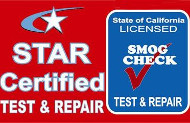11/30/2017
Report Finds Smog Checks Pointless With Modern CarsForcing millions of California motorists to undergo regular emissions inspections has had no measurable impact on air quality.

Modern engine technology has made regular emissions testing an exercise of dubious value. That was the finding of the National Bureau of Economic Research (NBER) in a report released last month. Researchers compared air quality data from California with the results of inspection station records to conclude that the government-mandated inspection program has had no effect on pollution levels.
Federal law says jurisdictions with air quality problems must adopt mitigation measures, which can include mandatory vehicle emissions inspection and repair programs. California's program, known as Smog Check, forces motorists to drive to an approved inspection location every other year, pay a fee of $30 to $70, and have an inspector plug into the vehicle's on-board diagnostic port to verify that no check-engine light failures have been triggered. New cars are exempt from testing for six years.
Nicholas J. Sanders, a professor at Cornell University's Department of Policy Analysis, and Ryan Sandler, an economist with the Consumer Financial Protection Bureau, decided to check whether this program has had any measurable impact at the tailpipe. To do so, they looked at the number of cars that failed their inspection and had to be re-inspected after a repair, assuming the pollution reduction comes after the identified problem is fixed.
The researchers examined the full record of every Smog Check inspection conducted between 1996 and 2012 and compared it with hourly, county-level pollution readings from the California Air Resources Board air quality database. The analysis found that by the year 2009, there were fewer old cars on the road, and the value of California's Smog Check program "fell rapidly."
After controlling for variables like weather, the analysis concluded that repairing 1000 cars manufactured before 1985 resulted in a reduction of carbon monoxide of 26 parts per billion and 1.9 parts per billion of nitrous oxide. Re-inspection of newer cars, however, resulted in a difference of zero.
"Re-inspections of vehicles manufactured after 1985 have much smaller effects on air pollution," Sanders and Sandler wrote. "This presents a case where the social efficiency of a program changes as the relevant technology advances -- potentially regulation-driven improvements in engine technology are making smog check programs, as currently designed, less socially efficient with time."
Because modern car are more efficient, there are fewer benefits to fixing them. The study found that repairing a 1984 vehicle with its older technology would reduce carbon monoxide emissions by 14,000 parts per million compared to the smaller benefit of fixing a 2001 car, which results in a reduction of just 1300 parts per million.
The report stops short of calling for the end of Smog Check. A copy of the report is available in a 600k PDF file at the source link below.


